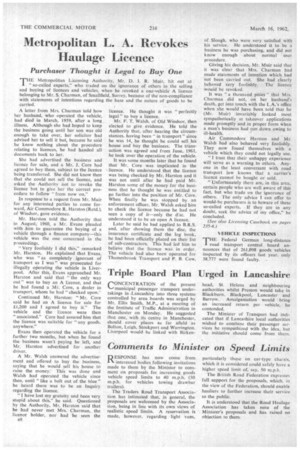Metropolitan L. A. Revokes Haulage Licence
Page 42

If you've noticed an error in this article please click here to report it so we can fix it.
Purchaser Thought it Legal to Buy One
THE Metropolitan Licensing Authority. Mr. D. 1. R. Muir, hit out at "so-called experts,who traded on the ignorance of others in the selling and buying of licences and vehicles, when he revoked a one-vehicle A licence belonging to Mr. S. Charman, of Smallfield, Surrey, because of the non-compliance with statements of intentions regarding the base and the nature of goods to be carried.
A letter from Mrs. Charman told how her husband, who operated the vehicle, had died in March, 1959, after a long illness. Although she had hoped to keep the business going until her son was old enough to take over, her solicitor had advised her to sell it but, because he said he knew nothing about the procedure relating to licences, he had handed all documents back to her.
She had advertised the business and licence for sale, and a Mr. J. Core had agreed to buy them, subject to the licence being transferred. She did not know then that she could not sell the licence, and asked the Authority not to revoke the licence but to give her the correct procedure to follow " from now on."
In response to a request from Mr. Muir for any interested parties to come forward, Air Commodore R. Harston (Retd.), of Windsor, gave evidence.
Mr. Harston told the Authority that in August; 1960, a Mr. Evans pleaded with him to guarantee the buying of a vehicle through a finance company—this vehicle was the one concerned in the proceedings.
" Very foolishly I did this," remarked Mr. Harston. He explained that Evans, who was "as completely ignorant of transport as I was" was prosecuted for illegally operating the vehicle in Liverpool. After this, Evans approached Mr. Marston and said that " the only way out" was to buy an A licence, and that he had found a .Mr. Core, a dealer in transport, whom he had "checked upon."
Continued Mr. Harston: "Mr. Core said he had an A licence for sale for £1,200 and I agreed to buy it." The vehicle and the licence were then "associated." Core had assured him that the licence was suitable for "any goods, anywhere."
Evans then operated the vehicle for a further two months, but when he found the business wasn't paying he left, and Mr. Harston advertised for another driver.
A Mr. Walsh answered the advertisement and offered to buy the business, saying that he would sell his house to raise the money. This was done and Walsh had operated the vehicle since then, until "like a bolt out of the blue" he heard there was to be an Inquiry regarding the licence.
"1 have lost my gratuity and been very stupid about this," he said. Questioned by the Authority. Mr. Harston said that he had never met Mrs. Charman, the licence holder, nor had he seen the e8 licence. He thought it was "perfectly legal" to buy a licence.
Mr. F. T. Walsh, of Old Windsor. then elected to give evidence. He told the Authority that, after hearing the circumstances, having been "in transport" since he was 14, he thought he could sell his house and buy the business. The transaction was agreed and from June, 1961, he took over the operation of the vehicle.
It was some months later that he found that Mr. Core was implicated in the licence. He understood that the licence was being checked by Mr. Harston and it was not until after he had paid Mr. Harston some of the money for the business that he thought he was entitled to go further into the position of Mr. Core. When finally he was stopped by an enforcement officer, Mr. Walsh asked him to check the licence because he had not seen a copy of it—only the disc. He understood it to be an open A licence.
Later he said he had applied to B.R.S. and, after showing them the disc, the insurance certificate and the log book, he had been officially placed on their list of sub-contractors. This had led him to believe that the licence was in order. The vehicle had also been operated for Thamesbrook Transport and P. B. Cow, of Slough, who were very satisfied with his service. He understood it to be a business he was purchasing, and did not know enough about normal user procedure.
Giving his decision, Mr. Muir said that it was clear that Mrs. Charman had made statements of intention which had not been carried out. She had clearly behaved very foolishly. The licence would be revoked.
It was "a thousand pities" that Mrs. Charman did not, on her husband's death, get into touch with the L.A.'s office when she would have been told that he (Mr. Muir) invariably looked most sympathetically at takeover applications made promptly and in proper form When a man's business had run down owing to ill-health.
Air Commodore Harston and Mr. Walsh had also behaved very foolishly. They now found themselves with a vehicle which they could not legally use.
" I trust that their unhappy experience will serve as a warning to others. Anyone in the least conversant with road transport law knows that a carrier's licence cannot be bought or sold.
"Unfortunately there are, in this area, certain people who arc well aware of this fact, but who trade on the ignorance of others. The only advice I can offer to would-be purchasers is to beware of these so-called experts. If they are in any doubt, seek the advice of my office," he concluded.
(See also Licensing Casebook on pages 235-6.) V EHICLE INSPECTIONS 'THE Federal German long-distance I road transport control board announces that of 261,098 goods vehicles inspected by its officers last year. only 38.777 were found faulty.




















































































































